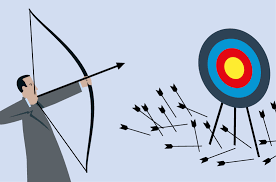
The Chess Blunder
Blundering is the bane of any chess-player. Just the thought of it or even the plosive sound of the word evokes an emotional reaction. The cliche phrase heard in chess playing areas across the world: "I had a slight edge/up a pawn/winning position, then I blundered!" is all too familiar. You might as well just say - "Then I lost." But the act of "blundering" is the ultimate mistake, the "king of mistakes" (pardon the pun). Just simply saying "I lost" would not be enough to explain the dire situation that you plunged yourself into through your own carelessness. A blunder is a move so costly it can ruin masterpieces in an instance and doom a player to a punishing (and sometimes long) defeat. All other previous moves (however good) might as well not have happened because of this one bad move! The two question marks it gluttons for from chess notations (??) suggest it is such a bad move, that the author is shouting: "What were you thinking! One question mark is not enough for your stupidity!"
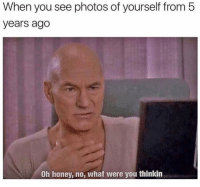
What was I thinking Picard??
https://www.flickr.com/photos/dailylolpics/25366228678 (labelled for non-commercial reuse)
One of my most recent blunders came in the final round of the British Chess Championships in the Rapid-play section. My opponent, instead of the battle-hardened old codgers I had grow accustomed to face, was instead a 10-year old boy. I asked him: "How long have you been playing then?" "2 years" he replied. This is a dream opponent I thought! An easy bagged win for me! How wrong I was...
 I am definitely not sharing these with anyone! Mcdonalds is what I call impulsive eating: It seems like a great idea at the time but you feel pretty horrible after eating it :'(
I am definitely not sharing these with anyone! Mcdonalds is what I call impulsive eating: It seems like a great idea at the time but you feel pretty horrible after eating it :'(The recent experience reminded me that blunders can be a great detriment to players. Indeed blunders can be so severe to the chess players psyche it can force players into exile, unable to face the 64-squares again lest they be reminded of their utter failure (Chess players PTSD). Blundering, in this context, can be a serious threat to the game. Around 3 years ago I remember my chess friend, whom I had played thousands of games with and went to weekend congresses with, after a game decided to quit playing altogether! It was all because he blundered a piece in the middle-game ruining his position. I remember him stating: "I was doing okay, very drawish position, ... then boom! ... Like I had just been hit with a cold shower!" That cold shower was enough to force him away from the game and sadly he has not played a competitive game since. To be fair, what I didn't mention with this story was that he had slowly been getting more and more disinterested with the game throughout the year. That game was simply the straw that broke the camel's back. It is sad to hear that such a mistake can cause so much pain that it can force a player away from the game. Chess can be such a cruel sport!

Chess can really make a monkey out of you! (labelled for non-commercial reuse)
In writing this blog I wanted to uncover some of the reasons why we blunder and then look at some of the biggest clangers by the masters. The real aim is to show that chess players even masters are but human and at the very least give some encouragement that you are not that bad at chess.
The origins of Blunder
I thought it would be interesting to find out where the word originated from and also why, by association, has it entered into chess lexicon.
From https://www.etymonline.com/word/blunder
Verb:
mid-14c., "to stumble about blindly," from a Scandinavian source akin to Old Norse blundra "shut one's eyes," perhaps from Proto-Germanic *blinda- "blind" (see blind (adj.)). Meaning "make a stupid mistake" is first recorded 1711. Related: Blundered; blundering.
Noun:
late 14c., blonder, blunder, "disturbance, strife; trouble, distress;" apparently from blunder (v.). Original sense obsolete. Meaning "a mistake made through hurry or confusion" is from 1706.
The definition has Scandinavian roots back to the 14th century. I think it is interesting that it derives from the old norse blundra: "shut one's eyes." It is almost saying, "you made such a mistake (blundra) that you might as well had your eyes closed!" (Although tell that to great blindfold players like Magnus Carlsen). It is also of interest that in Swedish, blunder is the same as the English word and has the exact same meaning supporting the claim that it has Old Norse roots (this is according to Wiktionary - so sorry to any Swedish people if this is not the case). In Cymraeg/Welsh "blunder" is just "blunder"... I am very disappointed Wales! You tend to have some very interesting ways of saying English words!
shutting one's eyes you say? Tell that to Carlsen!
The noun definition gives us some inclination as to why blunders can be linked to the sting of defeat that we experience in chess. "Disturbance, strife, trouble, distress" - All words that denote the hardships we experience in the aftermath of making such moves. How many of you have ever experienced any of these symptoms after a long duel in a stressful tournament environment?
Sadly, whilst the etymology sites provide the date for the first usage of the word, they do not actually show you the works they came from (or most likely it is behind a paywall). It's first usage, a source from 1706, may have been old Swedish chess manuscript from a chess player we didn't know about who used the word to say that his opponent was so bad he might has well been blind! Sad to say we will never know - I will be writing to Susie Dent on Countdown for her "origin of words" for more information!
Maybe Susie can provide us answers!
So why do we do it??
Let's face it, as humans we all make mistakes. To misquote Alexander Pope: "It is human to err" after all. Working out the reason why chess players make mistakes will most likely require a PHD in psychology, endless rats in lab-tests and a life-time of research to find the answer. Thankfully I was able to fulfil one of these criteria and I turned to my lab-rats... Well Reddit... In researching this topic I thought to myself why not turn to the genius of the crowd? Maybe they can provide me with the answers I so desperately desire? I decided to run a straw poll onRreddit to ask chess players why we blunder:
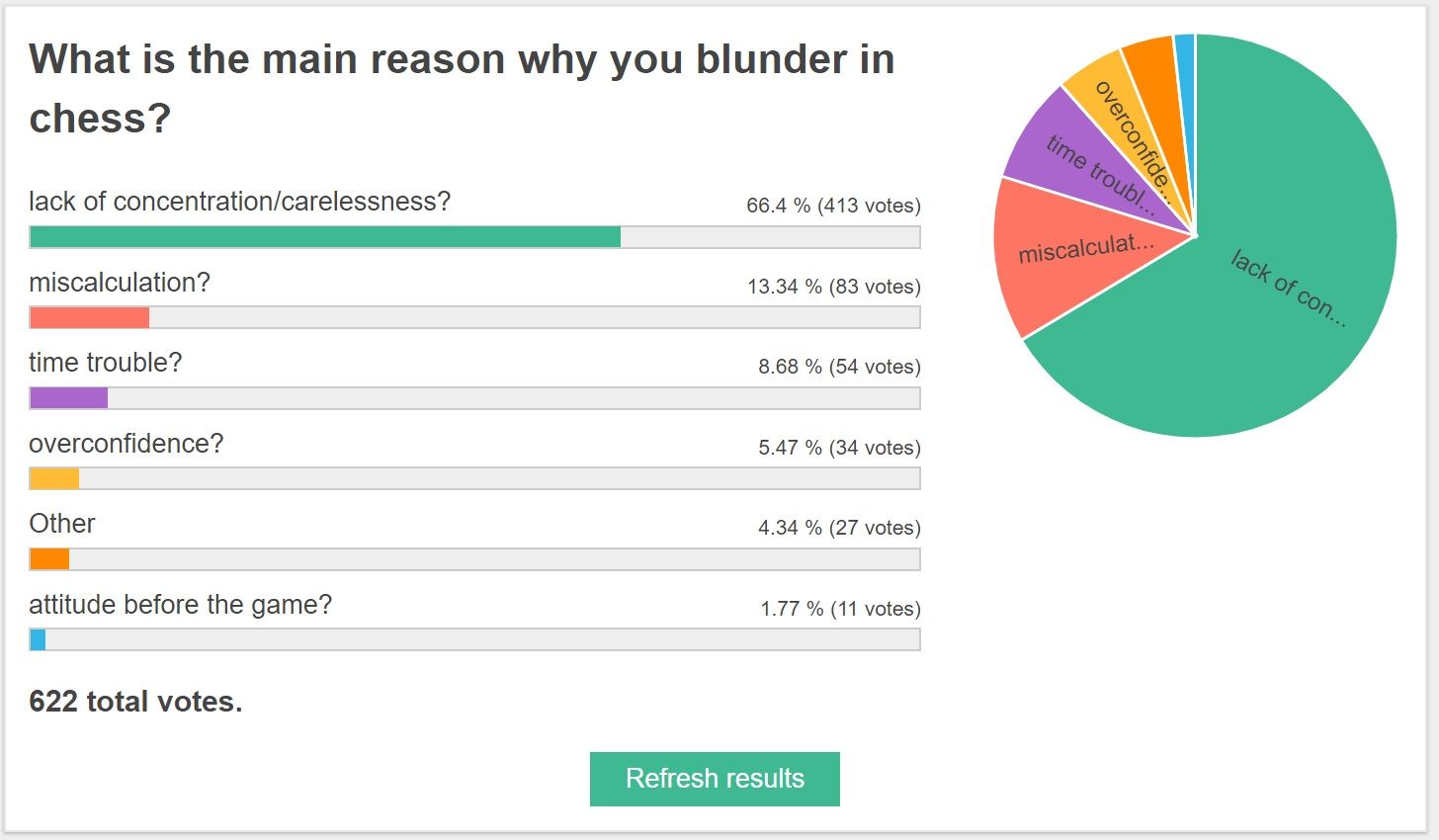
Out of the 622 responses I had, 66.4% of responses were because of a lack of concentration/carelessness. Conclusive evidence? Or rather just the definition of blunder? So basically my poll proved that my audience know how to define a chess blunder... Sadly my statistical skills of providing a decent straw poll were very poor. The statistics were a complete waste of time...
However I received salvation from the witty Reddit comments!

 Okay perhaps not...
Okay perhaps not...
My poll proved frivolous. Not even normal chess players could really diagnose and pin-point the reason why they blunder. If anything, blundering just simply happened out of the blue! Like a random computer bug due to faulty programming, our brains simply were imperfect. One minute we are playing like Fischer, the next like a complete Patzer!
Despite this we can access some constants before we blunder and one reddit comment came to the rescue: 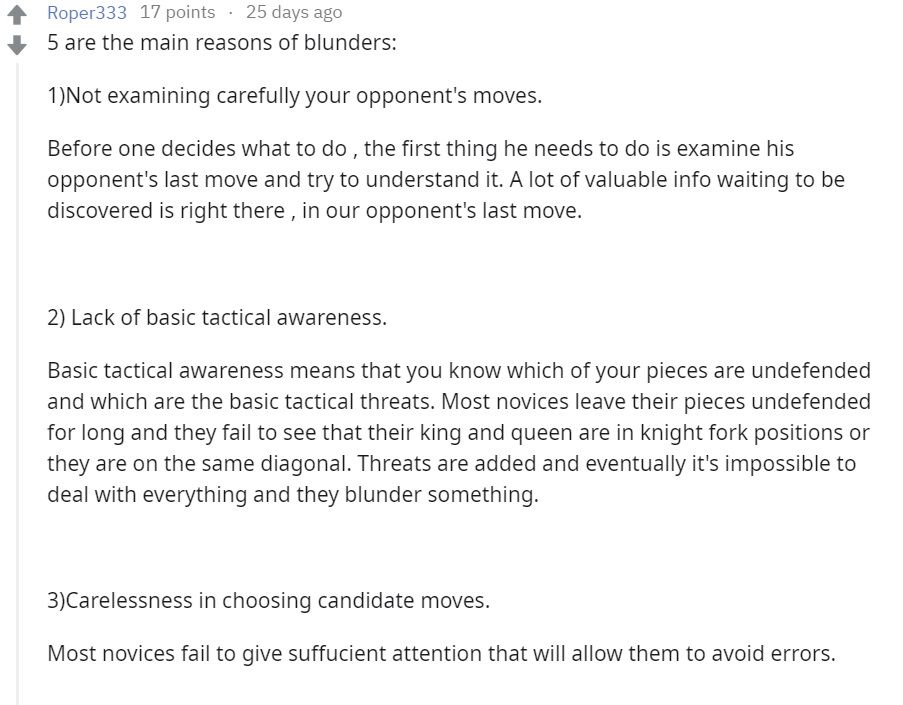
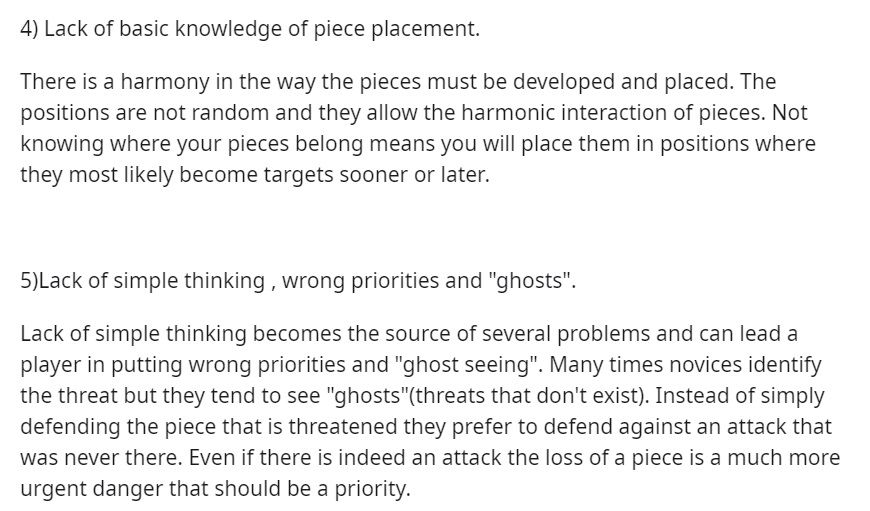
Roper33 had stolen the show with his answer. He had perfectly diagnosed the point in which we blunder. Whilst the central cause is carelessness, the root of our blunders can be rooted to a number of factors - not assessing the position properly, seeing ghosts and even just simply a lack of tactical awareness.
The masters blunder too
Chess masters are always a source of exemplar play. Two masters playing near perfect chess without erring whatsoever. They had fully mastered roper33's sage advice and became impervious to massive mistakes... Oh so I thought.... Oh how naive this thought was. Sadly masters, like us, blunder all the time! - Albeit a lot less than us. Sadly, for professional masters, due to the sheer volume of playing so much chess, eventually they would play some proper clangers:
Viswanathan Anand

Viswanathan Anand! World Champion Chess player. The master of preparation in the opening! Surely a world champion can not blunder like us mere mortals! (labelled for non-commercial reuse)
Joel Benjamin's blunder
Alright that was just a simple oversight by Anand on move 5. Surely this is just one isolated blunder by one player? What about a blunder in the heat of battle?
Grand-master Joel had a very playable equal position. In an instance he throws it all away!
Garry Kasparov makes blunders?
Perhaps a more famous game is Garry Kasparov against the chess computer deep blue:

The end of humanity? Or just a hunk of silicon? (labelled for non-commercial reuse)
Garry Kasparov, considered one of the best players of all time! Here however, he falls victim to the cold calculated killer that is Deep Blue, and with it humanities last stand against the machine (overly dramatic in retrospect). Garry Kasparov doesn't really blunder in this game but just makes a series of mini blunders leading to his defeat
The worse clanger (in my opinion)

David Bronstein was one of the strongest players of the 1950s. After the Second World War, Bronstein was at the time, one of the best players in the world and contended for the "1951 world championships" against title holder Mikhail Botvinnik.
The game ended 12-12. In another life, had Bronstein avoided this blunder, he could have become a world champion! However in an act of madness, he blundered his chance away.
Conclusions
So what have we learned today? Blundering can happen a lot of different ways. Humans for whatever reason are just not silicon calculators, incapable of making mistakes, like our computer friends. We simply "err" a lot, make poor decisions or just simply have not trained our minds enough to avoid bad blunders like we saw in the games. Sadly though even the masters are not immune to the condition of being human. Despite all our creativity and amazing achievements, all humans blunder from time to time. It is in my view that instead of wincing at the thought of it, we should embrace it, celebrate it even!
Here's to being human!